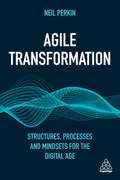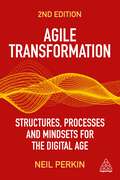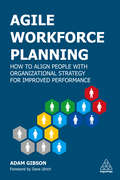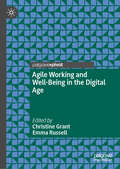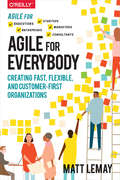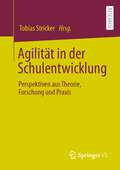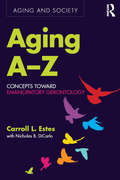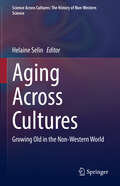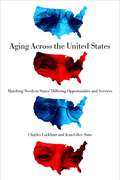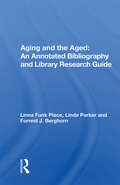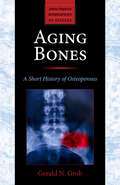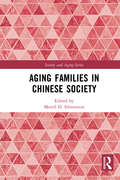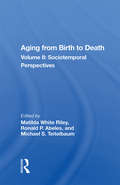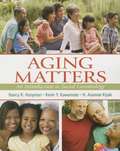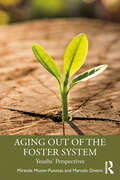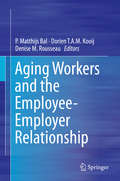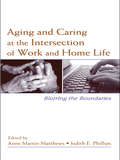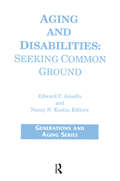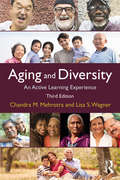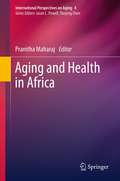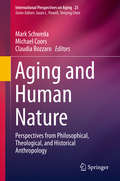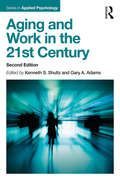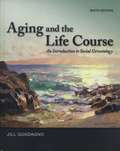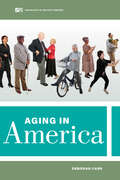- Table View
- List View
Agile Transformation: Structures, Processes and Mindsets for the Digital Age
by Neil PerkinTraditional organizational structures and cultures are no longer fit for purpose in a digitally-empowered world. The number of new and disruptive technologies is increasing, the speed of change shows no sign of slowing down and organization development practitioners and business leaders need to act urgently to enable their companies to succeed in the digital age. Agile Transformation is the much-needed guide on how to achieve this success. Packed full of practical advice, this book covers everything from why new operating models are needed, how to apply agile principles at scale, leverage digital-native processes and why change managers need to think big but start small.Agile Transformation also covers how to build and engage high performing teams for change, how to tackle the employee mindset that can hinder agile adoption and why developing an agile business is not an excuse to fail to plan. There is also guidance on how to develop fast and focused high-velocity decision making, build momentum for change and apply an agile approach to different business functions including HR, Finance, Sales, Operations and Procurement. This book is crucial reading for all businesses wanting to effectively compete in the new world of work.
Agile Transformation: Structures, Processes and Mindsets for the Digital Age
by Neil PerkinHow can business leaders and organization development professionals enable their companies to succeed in a digital age? Use the second edition of Agile Transformation to improve business performance. Packed full of practical advice, this new edition features updates on data-driven decision-making and the importance of putting it at the centre of mindset change and transformation to empower teams to make decisions. As well as updates to case studies, there is extended material on agile structures, including team alignment, developing agile culture and leadership.Agile Transformation covers all aspects of business transformation, including why new operating models are needed, how to apply agile principles at scale, leveraging digital-native processes and why change managers need to think big but start small. It also looks at how to build and engage high-performing teams for change, how to tackle employee mindsets that can hinder agile adoption and why developing an agile business is not a reason to fail to plan. Featuring case studies from organizations including Amazon, Netflix and Vodafone, this is crucial reading for businesses wanting to effectively compete in the new world of work.
Agile Workforce Planning: How to Align People with Organizational Strategy for Improved Performance
by Adam GibsonAgile Workforce Planning is a practical guide for HR and organization development practitioners needing to align their staff, skills and resources with evolving company goals. As business priorities change and focus shifts to address arising issues, HR professionals need to be able to reorganise talent swiftly and plan for future needs to enable the business to succeed. It covers how to forecast organizational demand for people, resources and skills, analyze the gap between supply and demand and most importantly, how to fill this gap. This book explains how to use agile workforce planning to achieve this. It also covers how to identify the skills needed in the workforce, where these skills are already available and when they're missing, how to decide whether to buy, borrow or build them.Agile Workforce Planning explains how to collect data to calculate and predict staff churn as well as how to use qualitative and quantitative demand modelling to forecast for future needs and provides strategies to address these including lateral internal recruitment. There is also expert guidance on horizon scanning, scenario planning and how to secure stakeholder buy in and engagement for an agile workforce plan. Supported by case studies from companies including Apple, Coca-Cola, Procter & Gamble, NATO and the UK National Health Service, this is essential reading for HR and OD professionals needing to continuously align the talent and capabilities in their workforce with the overall business strategy
Agile Working and Well-Being in the Digital Age
by Emma Russell Christine GrantWithin the digital era, agile working is imperative for organisations and workers to meet the needs of customers, service-users and ever-changing markets. This needs to be achieved whilst meeting goals of effectiveness and well-being. In this book, state-of-the-art theory is used to understand how to optimise agile working by addressing key issues around personality, team-working and management. The authors define the concept of agile working and unpack often-misunderstood terms associated with this, such as remote working and telework. The book explores the well-being consequences of agile work including sedentary behaviours, digital distraction, and digital resistance before offering insights for the future. Examining current practice in the context of established and emerging theory, the book paves the way towards further advances in the field and supports organisations seeking to make agile working work for them. Agile Working and Well-being in the Digital Age provides a valuable new resource for practitioners and scholars in the fields of occupational and organizational psychology, human resource management, organisational development, mental health and well-being.
Agile for Everybody: Creating Fast, Flexible, and Customer-First Organizations
by Matt LeMayThe Agile movement provides real, actionable answers to the question that keeps many company leaders awake at night: How do we stay successful in a fast-changing and unpredictable world? Agile has already transformed how modern companies build and deliver software. This practical book demonstrates how entire organizations—from product managers and engineers to marketers and executives—can put Agile to work.Author Matt LeMay explains Agile in clear, jargon-free terms and provides concrete and actionable steps to help any team put its values and principles into practice. Examples from a wide variety of organizations, including small nonprofits and global financial enterprises, bring to life the on-the-ground realities of Agile across industries and functions.Understand exactly what Agile is and why it mattersUse Agile to address your organization’s specific needs and goalsTake customer centricity from theory into practiceStop wasting time in "report and critique" meetings and start making better decisionsCreate a harmonious cycle of learning, collaborating, and deliveringLearn from Agile experts at companies like IBM, Spotify, and Coca-Cola
Agilität in der Schulentwicklung: Perspektiven aus Theorie, Forschung und Praxis
by Tobias StrickerUm Schule zukunftsfähig zu machen, bedarf es mehr denn je großer Anstrengungen möglichst aller Beteiligter. Aus der Kreativwirtschaft oder Softwarebranche kommend, werden agile Arbeits- und Herangehensweisen im Zusammenhang insbesondere mit komplexen Themen- und Problemstellungen zunehmend auch im Schulkontext diskutiert. Agiles Arbeiten verspricht bei Schulentwicklungsprozessen z. B. flexiblere und auch schnellere sowie passgenaue Reaktionen auf Veränderungen. Auch im Unterricht befördern agile Herangehensweisen und Methoden flexibles Arbeiten sowie Kooperation, Kreativität und Innovationfreude bei Schülerinnen und Schülern.Der Band stellt zunächst grundlegende theoretische Zugänge zum Thema „Agilität“ vor. Anschließend werden Perspektiven mit Blick auf Schule, Schulentwicklung und Schulsystem aufgezeigt. Mehrere Praxisbeispiele runden den Sammelband ab.
Aging A-Z: Concepts Toward Emancipatory Gerontology (Aging and Society)
by Carroll L. Estes Nicholas B. DiCarloThis provocative, intellectually charged treatise serves as a concise introduction to emancipatory gerontology, examining multiple dimensions of persistent and hotly debated topics around aging, the life course, the roles of power, politics and partisanship, culture, economics, and communications. Critical perspectives are presented as definitions for reader understanding, with links to concepts of identity, knowledge construction, social networks, social movements, and inequalities. With today’s intensifying concentration of wealth and corporatization, precarity is the fate for growing numbers of the world’s population. Intersectionality as an analytic concept offers a new appreciation of how social advantage and disadvantage accumulate, and how constructions of race, ethnicity, class, ability, and gender influence aging. The book’s entries offer a bibliographic compendium, crediting the salience of early pioneering theorists and locating these within the cutting-edge of research (social, behavioral, policy, and gene–environment sciences) that currently advances our understandings of human development, trauma, and resilience. Accompanying these foundations are theories of resistance for advancing human rights and the dignity of marginalized populations.
Aging Across Cultures: Growing Old in the Non-Western World (Science Across Cultures: The History of Non-Western Science #10)
by Helaine SelinThis volume brings together chapters about aging in many non-Western cultures, from Africa and Asia to South America, from American Indians to Australian and Hawaii Aboriginals. It also includes articles on other issues of aging, such as falling, dementia, and elder abuse. It was thought that in Africa or Asia, elders were revered and taken care of. This certainly used to be the case. But the Western way has moved into these places, and we now find that elders are often left on their own or in institutions, as younger people have migrated to other cities and even countries. Grandparents often find themselves being parents to their grandchildren, a far cry from the kind of life they believed they would have as they aged. This book will explore all these issues and will be of use to students and researchers in this relatively new field.
Aging Across the United States: Matching Needs to States’ Differing Opportunities and Services
by Charles Lockhart Jean Giles-SimsOlder Americans experience stages of aging with distinct priorities. For younger retirees, climate can be most important; for older retirees, quality of health care. Various states support these and other priorities to sharply different degrees. While many Americans know which states offer mild climates for outdoor recreation, they rarely know which states offer the best medical care to Medicare patients. This book tells them and suggests sequential moves to take advantage of states’ varying strengths.
Aging And The Aged: An Annotated Bibliography And Library Research Guide (New Horizons In Marketing Ser.)
by Linna Funk PlaceThis book introduces undergraduates to library research in the field of gerontology and focuses on the wide variety of sources available for research. It covers physiological and psychological aspects of aging; social aspects of aging; and environmental aspects of aging.
Aging Bones: A Short History of Osteoporosis (Johns Hopkins Biographies of Disease)
by Gerald N. GrobHow osteoporosis went from a normal aging process to a disease.In the middle of the twentieth century, few physicians could have predicted that the modern diagnostic category of osteoporosis would emerge to include millions of Americans, predominantly older women. Before World War II, popular attitudes held that the declining physical and mental health of older persons was neither preventable nor reversible and that older people had little to contribute. Moreover, the physiological processes that influenced the health of bones remained mysterious. In Aging Bones, Gerald N. Grob makes a historical inquiry into how this one aspect of aging came to be considered a disease.During the 1950s and 1960s, as more and more people lived to the age of 65, older people emerged as a self-conscious group with distinct interests, and they rejected the pejorative concept of senescence. But they had pressing health needs, and preventing age-related decline became a focus for researchers and clinicians alike.In analyzing how the normal aging of bones was transformed into a medical diagnosis requiring treatment, historian of medicine Grob explores developments in medical science as well as the social, intellectual, economic, demographic, and political changes that transformed American society in the post–World War II decades.Though seemingly straightforward, osteoporosis and its treatment are shaped by illusions about the conquest of disease and aging. These illusions, in turn, are instrumental in shaping our health care system. While bone density tests and osteoporosis treatments are now routinely prescribed, aggressive pharmaceutical intervention has produced results that are inconclusive at best. The fascinating history in Aging Bones will appeal to students and scholars in the history of medicine, health policy, gerontology, endocrinology, and orthopedics, as well as anyone who has been diagnosed with osteoporosis.
Aging Families in Chinese Society (Society and Aging Series)
by Merril D. SilversteinDeclining fertility rates and increased life expectancies over the last few decades have conspired to make China one of the more rapidly aging societies in the world. Aging Families in Chinese Society focuses on the accelerated social and demographic changes in China and examines their implications for family care and support for older adults. Contributors to this landmark volume portray various challenges facing aging families in China as a result of reduced family size, changing gender expectations, rapid economic development and urbanization, rural-to-urban migration, and an emerging but still underdeveloped long-term care system. Divided into four thematic areas – Disability and Family Support; Family Relationships and Mental Health; Filial Piety and Gender Norms; and Long-term Care Preferences – chapters in this volume confront these burgeoning issues and offer salient policy and practice considerations not just for today’s aging population, but future generations to come. Combining quantitative data from social surveys in China, comparative surveys in Taiwan and Thailand, and qualitative data from in-depth interviews, Aging Families in Chinese Societies will be of significant interest to students and researchers in aging and gerontology, China and East Asian Studies and population studies.
Aging From Birth To Death: Volume 2, Sociotemporal Perspectives
by Michael S. Teitelbaum Ronald P. Abeles Matilda White RileyThis book provides deeper understanding of the aging process, of the likely differences between the lives of past and future generations, and of the potential for optimizing these future lives from cross-cultural and cross-temporal perspectives.
Aging Matters: An Introduction to Social Gerontology
by Nancy R. Hooyman H. Asuman Kiyak Kevin Y. KawamotoPresents Social Gerontology from Multiple Perspectives Aging Matters illuminates cultural, biological, physiological, emotional, cognitive, economic, and social aspects of aging. A useful guide to a range of disciplines, this title helps readers of all educational backgrounds understand the dynamic interactions between older people and their environments.
Aging Out of the Foster System: Youths' Perspectives
by Marcelo Diversi Miranda Mosier-PuentesDecades of demographic studies and applied efforts have convinced scholars, students, and social workers that young people coming of age and transitioning out of the foster care system face great challenges in health, education, income, and general well-being. Despite the wealth of research on these outcomes, we know much less about the lived experiences of young people leaving foster care.Aging Out of the Foster System: Youths' Perspectives adds to this narrative the personal experiences of young people who are aging out or have aged out of their child welfare placement. The authors center the stories of these young people and apply critical ethnographic methods to frame their accounts with attention to the encounters within which they were produced, including power imbalances, institutional contexts, and relational dynamics.By centering the experiences of youths in these contexts and attending to the larger forces at work, this book helps connect the dots between youth aging out of the foster care system, social workers in Independent Living Programs, and the professors and scholars teaching the next generations of professionals working to support the aging out process.
Aging Workers and the Employee-Employer Relationship
by Denise M. Rousseau P. Matthijs Bal Dorien T.A.M. KooijThis book focuses on the aging workforce from the employment relationship perspective. This innovative book specifically focuses on how organizations can ensure their aging workers remain motivated, productive and healthy. In 15 chapters, several experts on this topic describe how organizations through effective human resource management can ensure that workers are able to continue working at higher age. In addition, this book discusses the role older workers themselves play in continuing work at higher age. To do this, the authors integrate research from different areas, such as literature on leadership, psychological contracts and diversity with literature on the aging workforce. Through this integration this book provides innovative ways for organizations and workers to maintain productivity, motivation and health. Aging Workers and the Employee-Employer Relationship summarizes the latest research on how employment relationships change with age and its implications for supporting the well-being, motivation and productivity of older workers. It identifies ways to improve how both companies and workers solve the problems they face. These include better designed employment practices and more adaptive job content and developmental opportunities for aging workers along with activities aging workers can engage to enhance their own job crafting, learning and employability.
Aging and Caring at the Intersection of Work and Home Life: Blurring the Boundaries
by Anne Martin-MatthewsThere are not many books that address the boundaries of care of older people from a work-life perspective. This book, authored by contributors from various countries, looks at the boundaries of care by looking at private and public help, professional and personal help and paid and unpaid caregivers. It captures and conceptualizes the complexity of the intersection of work and home life as it relates to the provision of assistance and support to older relatives in a variety of "care work" contexts. It explores these issues within a critical framework, rather than from an assumed stress or burden perspective, which dominates current texts on the topic. Readers of this volume will gain a deeper understanding of issues of care provision amongst "networks" of careers and helpers, and of the particular dynamics of care when it is episodic or framed by constrains of space and time as a result of geography. In addition, each chapter addresses issues of diversity with sensitivity to gender, race and ethnicity. This book will be of use to academics and graduate students in Gerontology, Family Studies, IO psychology, Gender Studies and Sociology.
Aging and Disabilities: Seeking Common Ground
by James J CallahanThis book helps in ...building a bridge between the networks...The topics of aging and disabilities are multifaceted and therefore may be approached in many ways. The editors have chosen to focus on four systems and areas of common ground (aging, developmental disabilities, independent living movement, and rehabilitation), to investigate the emerging "intersection" of the two fields.
Aging and Diversity: An Active Learning Experience
by Chandra Mehrotra, Ph.D. Lisa Smith WagnerAs the older population in the United States is becoming more racially and ethnically diverse, it is important to understand the characteristics, the potential, and the needs of this population. In this new and fully revised edition of Aging and Diversity, Chandra Mehrotra and Lisa Wagner address key topics in diversity and aging, discussing how the aging experience is affected by not only race and ethnicity but also gender, religious affiliation, social class, rural-urban community location, and sexual orientation and gender identity. Taking this broad view of human diversity allows the authors to convey some of the rich complexities facing our aging population – complexities that provide both challenges to meet the needs of a diverse population of elders and opportunities to learn how to live in a pluralistic society. Mehrotra and Wagner present up-to-date knowledge and scholarship about aging and diversity in a way that engages readers in active learning, placing ongoing emphasis on developing readers’ knowledge and skills, fostering higher order thinking, and encouraging exploration of personal values and attitudes.
Aging and Health in Africa (International Perspectives on Aging #4)
by Pranitha MaharajPopulation aging is a matter of global concern. It often occurs in tandem with changes in the health profile of the population. In Africa, many countries are already facing a high burden of communicable diseases. However, as more and more children survive childhood and move on to adult years and old age they are also more likely to experience health problems associated with the aging process. Population aging in Africa is occurring in the context of high levels of poverty, changing family structures, an immense disease burden, fragile health systems and weak or poorly managed government institutions. This book shows that aging is likely to lead to increased social and economic demands for the continent. However, most national governments in Africa have not begun to address the issue of how to respond effectively to the needs of the older population. This will require a better understanding of the socio-economic and demographic situation of the older population in Africa. This book fills the gaps that exist by exploring the social realities of population aging in Africa. It also focuses on the policy and programmatic responses, gaps and future challenges related to aging across the continent.
Aging and Human Nature: Perspectives from Philosophical, Theological, and Historical Anthropology (International Perspectives on Aging #25)
by Mark Schweda Michael Coors Claudia BozzaroThis book focuses on ageing as a topic of philosophical, theological, and historical anthropology. It provides a systematic inventory of fundamental theoretical questions and assumptions involved in the discussion of ageing and old age. What does it mean for human beings to grow old and become more vulnerable and dependent? How can we understand the manifestations of ageing and old age in the human body? How should we interpret the processes of change in the temporal course of a human life? What impact does old age have on the social dimensions of human existence? In order to tackle these questions, the volume brings together internationally distinguished scholars from the fields of philosophy, theology, cultural studies, social gerontology, and ageing studies. The collection of their original articles makes a twofold contribution to contemporary academic discourse. On one hand, it helps to clarify and deepen our understanding of ageing and old age by examining it from the fundamental point of view of philosophical, theological, and historical anthropology. At the same time, it also enhances and expands the discourses of philosophical, theological, and historical anthropology by systematically taking into account that human beings are essentially ageing creatures.
Aging and Work in the 21st Century (Applied Psychology Series)
by Kenneth S. Shultz Gary A. AdamsAging and Work in the 21st Century, 2nd edition, reviews, summarizes, and integrates existing literature from various disciplines with regard to aging and work, but with a focus on recent advances in the field. Chapter authors, all leading experts within their respective areas, provide recommendations for future research, practice, and/or public policy. Fully revised and updated, the second edition takes up many of the same critical topics addressed in the first edition, and incorporates twelve new authors across the volume and three brand new chapters on recruitment and retention, legal issues, and global issues in work and aging. The intended audience is advanced undergraduate and graduate students, as well as researchers in the disciplines of industrial and organizational psychology; developmental psychology; gerontology; sociology; economics; and social work. Older worker advocate organizations, such as AARP, will also take interest in this edited book.
Aging and the Life Course: An Introduction to Social Gerontology
by Jill S. QuadagnoJill Quadagno's groundbreaking text Aging and the Life Course examines the relationship between quality of life in old age and its experiential catalysts. Throughout the text an emphasis is placed on the intersectionality of race, class, gender, and culture, and how these classifications affect quality of life. Students will come away with a broad background for understanding crucial and current policy debates.
Aging in America (Sociology in the Twenty-First Century #8)
by Deborah CarrThe aging of America will reshape how we live and will transform nearly every aspect of contemporary society. Renowned life course sociologist Deborah Carr provides a lively, nuanced, and timely portrait of aging in the United States. The US population is older than ever before, raising new challenges for families, caregivers, health care systems, and social programs like Social Security and Medicare. Organized in seven chapters, Aging in America covers these topics: the history of aging and the development of theoretical approacheshow cultural changes shape our views on agingthe demographic characteristics of older adults todayolder adults' family lives and social relationshipsthe health of older adults and social disparities in who gets sickhow public policies affect the well-being of older adults and their familieshow baby boomers, Gen Xers, and millennials will experience old age Drawing on state-of-the-art data, current events, and pop culture, this portrait of an aging population challenges outdated myths and vividly shows how future cohorts of older adults will differ from the generations before them.
Aging in Asia: Findings from New and Emerging Data Initiatives
by James P. SmithThe population of Asia is growing both larger and older. Demographically the most important continent on the world, Asia's population, currently estimated to be 4.2 billion, is expected to increase to about 5.9 billion by 2050. Rapid declines in fertility, together with rising life expectancy, are altering the age structure of the population so that in 2050, for the first time in history, there will be roughly as many people in Asia over the age of 65 as under the age of 15. It is against this backdrop that the Division of Behavioral and Social Research at the U.S. National Institute on Aging (NIA) asked the National Research Council (NRC), through the Committee on Population, to undertake a project on advancing behavioral and social research on aging in Asia. Aging in Asia: Findings from New and Emerging Data Initiatives is a peer-reviewed collection of papers from China, India, Indonesia, Japan, and Thailand that were presented at two conferences organized in conjunction with the Chinese Academy of Sciences, Indian National Science Academy, Indonesian Academy of Sciences, and Science Council of Japan; the first conference was hosted by the Chinese Academy of Social Sciences in Beijing, and the second conference was hosted by the Indian National Science Academy in New Delhi. The papers in the volume highlight the contributions from new and emerging data initiatives in the region and cover subject areas such as economic growth, labor markets, and consumption; family roles and responsibilities; and labor markets and consumption.
